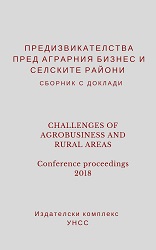ANALYSIS OF THE INDEX REVEALED COMPARATIVE ADVANTAGE (RCA) AMONG GREECE AND THE BALKANS EUROPEAN COMMUNITY COUNTRIES (2000-2015)
ANALYSIS OF THE INDEX REVEALED COMPARATIVE ADVANTAGE (RCA) AMONG GREECE AND THE BALKANS EUROPEAN COMMUNITY COUNTRIES (2000-2015)
Author(s): Petropoulos Dimitrios, Claudia Sandulescu
Subject(s): Economy, Agriculture
Published by: Университет за национално и световно стопанство (УНСС)
Keywords: competitiveness; international competitiveness; rural sector; trade balance
Summary/Abstract: In this paper the competitiveness of key agricultural industries in Greece is analyzed in relation to the rest of the world, using the index RCA (Revealed Comparative Advantage) for the period 2000-2015. The evaluation of the comparative advantage of Greece based on the so-called Balassa index is used to determine if a country has "disclosed" comparative advantage (RCA). The competitiveness against two Balkan countries, Romania and Bulgaria is also analyzed. These two countries were selected on the grounds that they are members of the European Union - and thus trade is made without restrictions - and that they are adjacent to Greece, which facilitates trade. Finally, these countries are in a constant rise in their living standards, which have an impact on consumption habits.The progress and long-term competitiveness of agriculture is not associated with both short-term factors, such as prices or input costs, but with productivity and organization at farm level and at the state level. Apart from the quantity, the natural wealth of the regions and technologies to reduce costs, more attention is given to adding value to the quality of the services they offer and other "off-price" factors.For a country like Greece, integrated into a key international financial institution such as the European Union, with a fully open economy and thus faced with the developments of the changing international environment, the analysis of the competitiveness of individual sectors of the economy never ceases to be timely and important. The measuring of the competitiveness of the agricultural sector is used to draw attention to the strengths and weaknesses in order to create a framework for corrective action, if needed, and suggestions for the future.In this paper the competitiveness of key agricultural industries in Greece is analyzed in relation to the rest of the world, using the index RCA (Revealed Comparative Advantage) for the period 2000-2015. The evaluation of the comparative advantage of Greece based on the so-called Balassa index is used to determine if a country has "disclosed" comparative advantage (RCA). The competitiveness against two Balkan countries, Romania and Bulgaria is also analyzed. These two countries were selected on the grounds that they are members of the European Union - and thus trade is made without restrictions - and that they are adjacent to Greece, which facilitates trade. Finally, these countries are in a constant rise in their living standards, which have an impact on consumption habits.The progress and long-term competitiveness of agriculture is not associated with both short-term factors, such as prices or input costs, but with productivity and organization at farm level and at the state level. Apart from the quantity, the natural wealth of the regions and technologies to reduce costs, more attention is given to adding value to the quality of the services they offer and other "off-price" factors.For a country like Greece, integrated into a key international financial institution such as the European Union, with a fully open economy and thus faced with the developments of the changing international environment, the analysis of the competitiveness of individual sectors of the economy never ceases to be timely and important. The measuring of the competitiveness of the agricultural sector is used to draw attention to the strengths and weaknesses in order to create a framework for corrective action, if needed, and suggestions for the future.
Book: Предизвикателства пред аграрния бизнес и селските райони
- Page Range: 21-27
- Page Count: 7
- Publication Year: 2018
- Language: English
- Content File-PDF

